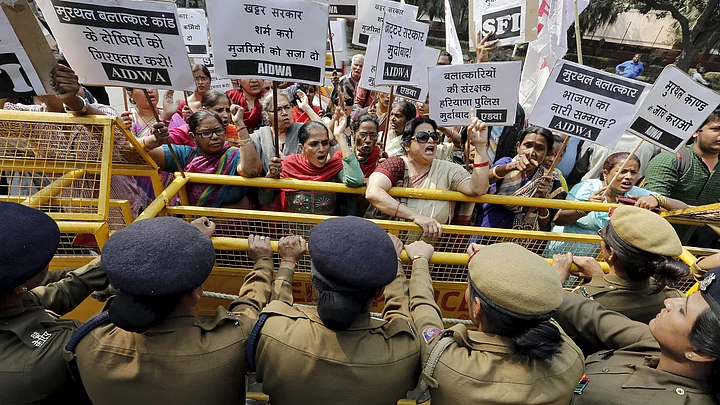A set of recent incidents involving gruesome rapes of women across the country has yet again raised several questions about Indian society and judiciary. We at The Quint believe that a rape survivor’s life doesn’t end when she is raped. And that even if our institutions - law, the judiciary, the hospitals - are failing a rape survivor, we as a society need to step up. And keep the fight going. We are publishing this article originally published on 29 June 2016 from The Quint’s archives as part of our #KeepFighting campaign.
The two-finger test is banned in India. It has a long history of misuse by doctors and lawyers who present its findings to pass judgement on a rape survivors’s virtue (read: virginity) and character (read: sexually active).
The National Commission for Women (NCW) submitted its report on the Motihari rape to the Prime Minister’s office on Wednesday. The report states that doctors conducted a two-finger test on the the 21-year-old who was allegedly gangraped and brutally assaulted. It concludes “vaginal orifice admitted two-finger loose”.
The test was conducted by doctors at the Motihari hospital despite a Supreme Court ban. In 2013, a two-judge bench had observed that the “two-finger test violates the right of rape survivors to privacy, physical and mental integrity and dignity. Thus, this test, even if the report is affirmative, cannot ipso facto, be given rise to presumption of consent.
Courts Should Discredit Two-Finger Tests
If the Bihar police’s delayed action was to disprove rape, the two-finger test is bound to be interpreted in court to discredit the survivor. Should the results of this two-finger test then be accepted as evidence by Court?
Speaking to The Quint, women’s rights lawyer and activist Flavia Agnes says that we need to now focus on what happens in courts, not just in hospitals.
Findings of the medical test used to be presented as evidence. Today our judges have to be alert and not allow it in trial courts. The responsibility rests on the legal, not medical profession.Flavia Agnes, Women’s Rights Lawyer
How Courts Misinterpret the Two-Finger Test
In 2013, women’s rights activist Kavita Krishnan started a Change.org petition to ban the two-finger test. The petition used the example of how a Madhya Pradesh court discriminated against a rape complainant on the basis of the two-finger test.
In an October 2012 verdict, a Madhya Pradesh court held that a rape complainant was a “consenting party” because “looking to her physical examination, she was habitual to do the intercourse and therefore she knew about the act but she did not complain to anybody till she reached home.”
What Had Happened
In 1972, two policemen in Chandrapur, Maharashtra got away with raping a young tribal girl called Mathura by arguing that consent was a given because she was habituated to sex. Legal activism in the late 1970s resulted in an amendment to Section 376 in 1983. Activists contended that consent involves submission, but submission may not necessarily mean consent. Among other things, the amendment put the onus on the alleged rapist to prove innocence. Unfortunately, this allowed for the two-finger test to become a yardstick for the victim’s morality which was raked up as recently as in the 2013 Suzette Jordan case.
“Two-Finger Test Is like Being Re-Raped”
Suzette Jordan, who waived her right to anonymity to dispel the taboo that comes along with being a rape survior in India, had gone on record to say that the humiliating two-finger test was like being “re-raped”.
As recently as last year, the Delhi Police issued a circular endorsing the two-finger test to say “it cannot be recommended that physicians be made to function under the constraint of a complete ban of these essential steps of internal examination of a sexual assault survivor.”
The ensuing media outrage forced the Delhi Police to beat a hasty retreat, and rightfully so.
The onus is now on our judiciary to not admit biased medical exams that cast aspersions instead of talking facts.
(At The Quint, we question everything. Play an active role in shaping our journalism by becoming a member today.)
